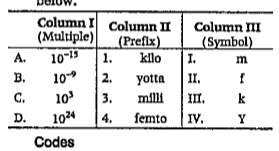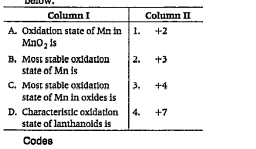Diaphragms are contraceptive devices used by the females. Choose the correct option from the statements given below
(i) They are introduced into the uterus
(ii) They are placed to cover the cervical region
(iii) They acts as physical barriers for sperm entry
(iv) They act as spermicidal agents.
i and ii
i and iii
ii and iii
iii and iv
The correct Answer is:c
Step by step video, text & image solution for Diaphragms are contraceptive devices used by the females. Choose the correct option from the statements given below (i) They are introduced into the uterus (ii) They are placed to cover the cervical region (iii) They acts as physical barriers for sperm entry (iv) They act as spermicidal agents. by Biology experts to help you in doubts & scoring excellent marks in Class 12 exams.
Updated on:21/07/2023Topper's Solved these Questions
- NCERT Exemplar Questions +2 (PRINCIPLE OF INHERITANCE AND VARIATION)BOOK - TRUEMAN BIOLOGYCHAPTER - NCERT Exemplar Questions +2 (PRINCIPLE OF INHERITANCE AND VARIATION)EXERCISE - MCQs
18 Videos
- NCERT Exemplar Questions +2 (REPRODUCTION IN ORGANIMS)BOOK - TRUEMAN BIOLOGYCHAPTER - NCERT Exemplar Questions +2 (REPRODUCTION IN ORGANIMS)EXERCISE - MCQs
18 Videos
Similar Questions
Knowledge Check
Diphragms are contraceptive devices used by the females. Choose the correct optin from the statements given below :
(i) They are introduced into the uterus
(ii) They are placed to cover the cervical region
(iii) They act as physical barriers for sperm entry
(iv) They act as sperimicidal agentsA(i) and (ii)B(i) and (iii)C(ii) and (iii)D(iii) and (iv)Diaphragmss are contracepitve device used by the females. Choose the correct option from the statement given below
AThey are introduced into the uterusBThey ar placed to cover the cervical regionCThey act as physical barriers for sperm entryDThey act as spermicidal agentsDiaphragms are contraceptive devices used by the females. Choose the correct option from the statements given below
(i) They are introduced into the uterus
(ii) They are placed to cover the cervical region
(iii) They acts as physical barriers for sperm entry
(iv) They act as spermicidal agents.A(i) and (ii)B(i) and (iii)C(ii) and (iii)D(iii) and (iv)
Diaphragms are contraceptive devices used by females. Choose the correct option from the statements given below:
I. They are introduced into the uterus.
II. They are placed to cover the cervical region.
III. They are an example of physical barriers.
IV. They act as spermicidal agents.
View SolutionMatch the items of columns I,II and III appropriately and choose the correct option from the codes given below.

View SolutionFollowing statements are given regarding MTP. Choose the correct options given below.
(i) MTPs are generally advised during first trimester
(ii) MTPs are used as a advised during first trimester
(iii) MTPs are always surgical
(iv) MTPs require the assistance of qualified medical personnel.
View SolutionRead the given statements and select the correct option
Statement 1 : Diaphragms, cervical caps and vaults are made of rubber and are inserted into the female reproductive tract to cover the cervix before coitus
Statement 2 : These are chemical barrier of conception which are reusable
View SolutionMatch the statements given in Column I with the oxidation states given in Column II and choose the correct option from the codes given below.

View Solution


